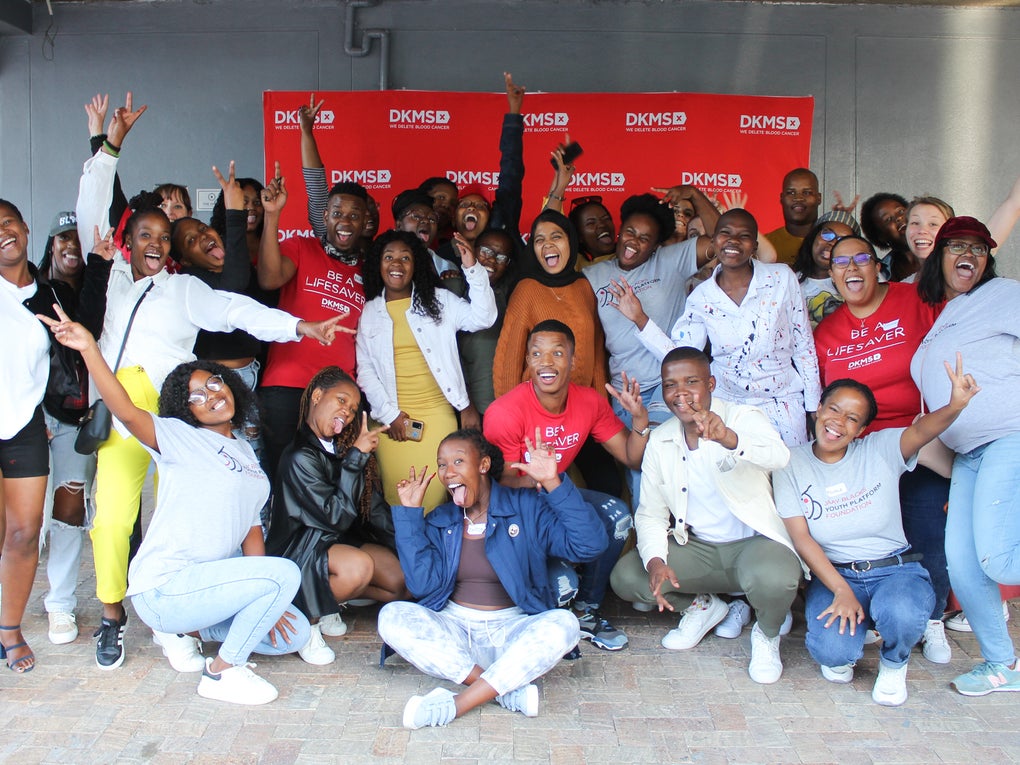
United by Hope campaign on blood disorders and stem cell transplantations reaches Khayelitsha youth
Social change begins with access to information and awareness
“Community engagement is essential in the fight against blood cancers”, these are the words of DKMS Africa Executive Director, Alana James, following a successful youth training workshop that was held in Khayelitsha last Saturday with 22 youth from the community. “The workshop is the beginning of a series of workshops that are aimed at bringing the message of blood cancer and blood stem cell transplantations to grassroots and community level. The insights that we gained on Saturday are significant and we are very excited to be able to report on them and duplicate these across other communities”, said James.
Called “United by Hope”, the aim of the training is to teach youth and community-led groups about blood disorders and blood cancers while at the same time demystifying myths and stigmas related to the illnesses. South Africa is not exempted from the scourge of blood disorders, with statistics painting a grim picture of rising diagnosis rates. Every five minutes someone in South Africa is diagnosed with a blood related disorder.
Blood cancer develops when the bone marrow and blood cells become affected by cancer and stop functioning – they no longer fight against infections or repair cells in the body. People diagnosed with blood cancer must then depend on the goodness of others to donate blood stem cells so they can survive.
Saturday’s community engagement was held in collaboration with Jaay Blacks Youth Foundation, a youth initiative that drives youth social projects in Khayelitsha focusing on employment opportunities, crime prevention, education and engagement. Founder, Jaay Mpeqeka said she joined the initiative out of a great concern about the lack of information and awareness about blood disorders and cancers. “I have participated in many blood stem cell donor drives and am well acquainted with the struggles of people and organisations that work in the space. Our role at Jaay Blacks is to firstly gain the necessary factual information and then ensure that we transmit and share this information in our own communities.”
The information session was facilitated by DKMS Africa at The Spade Hotel, the first four-star hotel in a South African township.
Feedback from two of the attendants included: “I have learnt about blood cancers and blood disorders and how to help those in need. I am so happy that I was a part of the DKMS Africa workshop,” Awonke Marafela.
“Having cancer is not the end of the world. People should register to become donors as you do not know when it will be your loved one that may be diagnosed with a blood disorder in the future and may need help,” Buhle Dyomfana.
Dr Theo Gerdener: Medical Director at DKMS Africa, which is the South African entity of the global DKMS family, explains, “There are three main types of blood cancer, namely Leukaemia, which affects white blood cells and bone marrow; Lymphoma, which directly affects the lymphatic system – the body’s shield against infectious diseases; and Myeloma, which is a tumour of the blood plasma cells that produce antibodies.”
There is no specific cause for blood cancer. Some factors are related to age, heredity, weakened immune system, infections, HIV/AIDS, smoking, excessive alcohol consumption, exposure to chemotherapy, organ transplantation, usage of certain hair dyes, certain kinds of petrochemicals, and maternal-foetal transmission in rare cases.
Treatment of cancer depends on the type of cancer, age, severity and many other factors. Some of the common treatments are radiation therapy to destroy cancer cells and relieve pain, chemotherapy to destroy cancer cells, and ultimately stem cell transplantation.
James concludes, “DKMS has registered over 11 million donors worldwide. Anyone who is healthy and between the ages of 18 and 55 is eligible to register, and if they are a successful match, the process of donating blood stem cells is painless, with no surgery or unaesthetic and is similar to donating blood.”
Four out of ten people looking for an unrelated matching donor worldwide are not able to find a match. According to various global studies, racial minorities are much less likely to find a suitable blood stem cell donor than their counterparts of European descent. Patients of African descent have less than 20% likelihood of finding a match, compared to that of 75% for White patients. This is why it’s essential for people of African descent to become stem cell donors (Gragert et al, 2014:371).
If you are in general good health and between the ages of 18 and 55, please consider joining the registry – all it takes is a few minutes of your time and a simple cheek swab. For more information or to register as a donor, please visit www.dkms-africa.org or call 0800 12 10 82, weekdays between 8.30am and 4.30pm. Once you have registered online, a swab kit is sent to you via courier and then collected when you have completed the process.